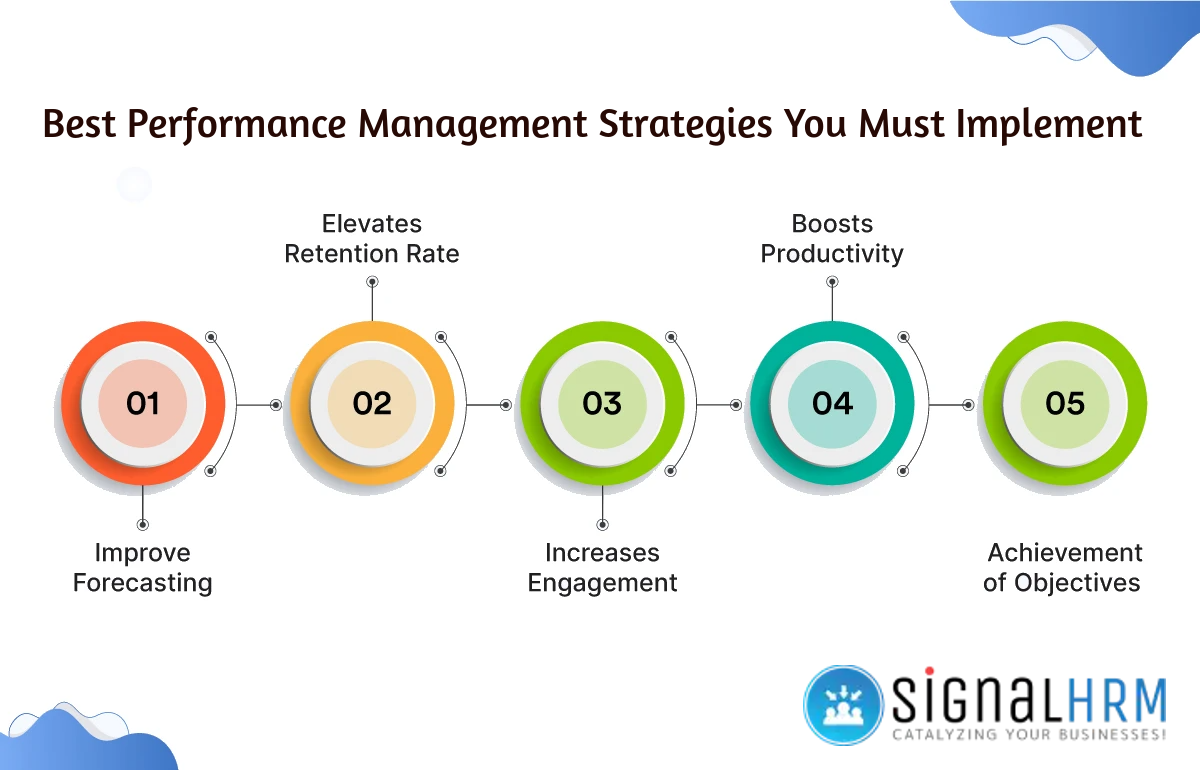
Performance management is an integral aspect of HRMS. It includes setting performance goals, tracking and assessing employees, providing feedback, recognizing their contributions, and rewarding them for significant achievements. HRMS management software has performance management modules that allow you to enhance employee performance, offer constructive feedback, and guide the team towards growth and development.
Elements of Performance Management System: The main elements of performance management system include:
- Planning
- Appraisal and Review
- Feedback
- Recognition and rewards
- Improvisation
Now let’s discuss some of the best performance management strategies that HRs can use:
Integrate Performance Management with the Company’s Goals:
Every company has goals that the employees need to accomplish. Aligning performance management with organizational objectives ensures high employee engagement and productivity. It guarantees that employees direct their efforts to tasks that are essential for the organization’s success. Further, it tracks performance gaps and makes it easy to fix the loopholes, enhancing operational efficiency.
Assess Goals Periodically:
Reviewing defined goals periodically and analyzing employee performance is essential. This helps the managers and employees to focus on the objectives, fostering transparency and accountability. Also, periodic reviews enable companies to adapt to changing situations. Also, this approach improves team and employee performance, ensuring the company remains aligned with its strategic objectives.
Set Achievable Goals:
Always define realistic goals and targets and communicate them clearly to the employees. Make sure the employees understand the job description and work accordingly to achieve the goals abiding by the company guidelines and expectations.
Plan a Strategic Workflow:
It is imperative to create a performance management workflow to set up a structured sequence of processes to direct the employees to achieve their goals. Note the expertise of each employee and gather employee performance data to make the workflow. This ensures that the employee has clarity on expectations, seeks guidance, and gets opportunities for growth and development. It promotes transparency and accountability, making them integral elements of performance management.
Ongoing Learning:
Implementing regular learning sessions is of utmost importance. The employees learn new skills and grab insights to align their expertise with their job roles and responsibilities. Ongoing learning cultivates a growth mindset and allows managers to find skill gaps and offer guidance. This further motivates the employees to enhance their performance and job satisfaction while actively participating in organizational growth.
Benefits of Using Performance Management Strategies
Clear Communication:
Implementing performance management strategies ensures clear communication between the employer and employees. It describes the expectations (in terms of goal accomplishment) leading to improved performance and productivity. Further, it minimizes conflicts and strengthens the relationships within the team, motivating everyone to contribute collectively.
Improves Efficiency:
Regular tracking and monitoring streamline the work process. It also makes it easy to identify potential areas that need improvement and encourages the employees to take remedial actions, leading to improved efficiency and productivity.
High Performance:
Well-designed and executed performance management strategies enable the organizations to sync the individual and team goals with the objectives of the organization. It promotes informed decision-making by offering data and insights to find potential areas of improvement and provide more resources if needed. The performance management strategies build a culture of accountability and persuade the employees to improve continuously.
Conclusion:
The success of performance management strategies depends on different factors and is a key measurement of the operational efficiency of an organization. With the help of HRMS software, you can easily track important metrics such as employee retention rates, employee engagement, and goal accomplishment and find out if your performance management strategies are working or not.